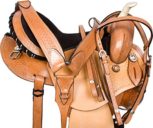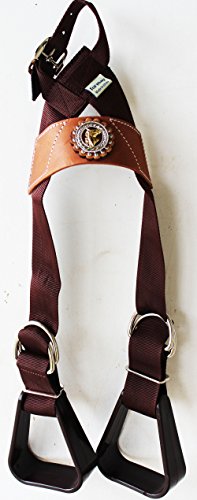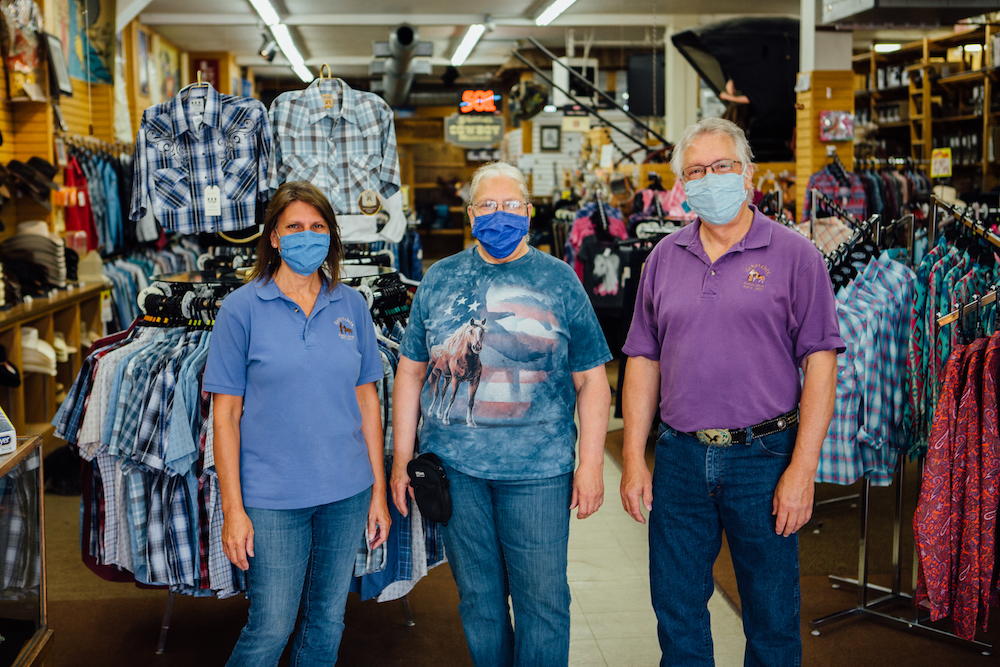The morning of May 18, Joan West reveled in running through the motions of unlocking her storefront door, putting a “We’re open” sign on her window and counting the money in her register.
Her store, the Schatzlein Saddle Shop in Whittier, has been open for 113 years. First run by her grandfather in 1907, the family business has been passed down for three generations. What started as a horse harness shop transitioned to a Western clothing and gear store now frequented by horse owners and lovers of cowboy boots and Levi’s jeans.
During the pandemic, West’s sales have dropped 80%. Before opening in-person on May 18, she offered curbside pickup and revamped her website to offer more options for online shoppers. Running a small storefront that rarely sees more than 10 customers at once even in normal times, West said she wishes she was able to open sooner.
Gov. Tim Walz’s partial reopening of retailers on May 18 was a welcome relief for many local businesses. Reopening comes at a price however, and retailers are scrambling to get financial help and properly equip their shops to enforce social distancing. Although opening quickly is essential for many to remain open, store owners worry about a second wave of the virus and how to keep their workers and customers safe.
Aaron Meyerring, an owner of the popular Whittier music and record store Electric Fetus, said the store’s closure due to COVID-19 has been especially hard. Without their normal crowd of customers thumbing through record albums or coming to intimate in-store concerts, the shop has lost 97% of its revenue since mid-March.
“It’s hard for retail stores, especially like ours, because we’re a browsing store,” he said. “You touch everything.”
He’s put some of the shop’s products online, but it has been labor-intensive to sort and ship packages. The store’s inventory also changes so frequently it is hard to keep the site current.
“Trying to navigate how to reopen has been a nightmare to be honest with you,” Meyerring said.
Many of his questions about loan forgiveness and finances have gone unanswered by the government and an influx of new information often forces him to keep delaying his reopening plans.
One of the reasons Electric Fetus didn’t open on May 18 was because it has been hard to come up with a sanitizing plan that will make workers feel at ease, he said. The current plan includes limiting the number of people inside the shop at a time, setting up sanitizing stations and creating “one-way” lanes for shoppers to look through boxes of records and still keep their distance.
Meyerring has also supplied his workers with cloth masks, rearranged the break room to offer more space and installed plexiglass shields by the registers. A majority of his staff have been with the shop for over 10 years, one member as long as 41. Making sure they are comfortable and healthy will not only help keep the shop open but is central to their community-oriented model.
“Our staff is like family to me,” he said. “Without them we wouldn’t be who we are.”
Thraicie Hawkner, an owner of Uptown Eye of Horus metaphysical shop, has been floating through the shutdown of her spiritual shop without financial assistance. As someone who uses a credit union rather than a bank to keep her business community-oriented, she has not been able to apply for certain government loans like the Paycheck Protection Program.
Although many of the tarot readers that work independently through her shop have been doing online readings, Hawkner said she doesn’t know when she will be able to open her physical shop again. Her wife is especially vulnerable to the virus, and Hawkner said she doesn’t want to risk putting her health in jeopardy.
It’s difficult to imagine how she would disinfect all of the books customers look through, so Hawkner said she’s settled with selling her materials online and meeting people in their entryway to exchange the goods they’ve purchased.
“We’re just not quite psychic enough to know when it’ll be time to open properly,” she said with a laugh. “So we’re doing this kind of open-ish.”
Thomas Norton, owner of Bryant Hardware in South Uptown, counts himself as one of the lucky ones. His business was designated as “essential,” so Bryant Hardware has been able to stay open. This has allowed Norton to continue paying his employees. Businesses like clothing stores and restaurants are faring worse, he said.
“A lot of these businesses … realize that they don’t have enough money to restock their stores so that they can open,” he said. “A lot of these jobs aren’t coming back. And that’s scary.”
Rick Haase, an owner of the Minnesota-based knick-knack store Patina, said mid-March was, with the exception of blizzards, the first time he’d ever had to close all eight of the chain’s stores.
Patina’s 300-person staff was reduced to three in March as the shop transitioned to online ordering and curbside pickup, something made difficult for a store that’s business model is centered on customers browsing the goods. Haase said people often shop at Patina because they don’t know what they want to buy and end up discovering it while in the store.
Now the company is sitting on a lot of extra inventory, especially trinkets and gifts that would have been popular sellers for Mother’s Day and graduation. After reopening on May 18, he said his shop has taken extra precautions like including more signage to discourage customers from picking up items and giving face shields to employees working at the jewelry counters. As of May 26, customers in retail shops and other public spaces in Minneapolis are also required to wear face coverings or risk a $1,000 fine.
Linda Jindra, an employee of the Patina in the Bryant neighborhood, said she was initially apprehensive to continue working because her parents are older and her sister works in health care. She said the shop’s social distancing precautions have made her feel more comfortable at work, and the frequent communication has helped her feel in the loop as well.
National economists have predicted that over 100,000 small businesses in the U.S. have already closed permanently since the pandemic started. Haase said the fallout has the potential to devastate the entire supply chain backing retailers like Patina. Already he has seen trade shows he normally attends canceled and many wholesalers going out of business.
Although the uncertain future is stressful, Haase said, the only thing busi- nesses like his can do is wait and focus on what tangible things they can control.
“There’s really no crystal ball for this one,” he said. “We just have to wait and see where the good is when this is over.”








Comments
Comments are disabled for this post.